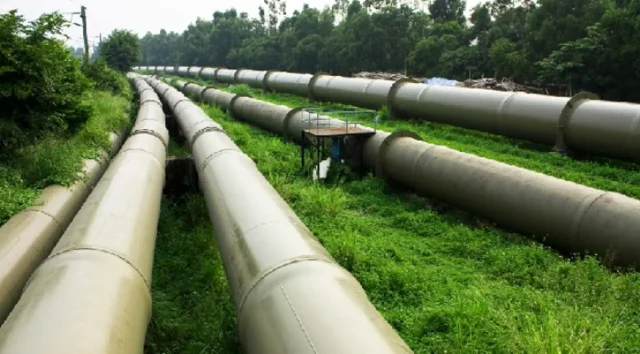For nearly half a century, Nigeria’s vast economic promise has been crippled by pipeline vandalism and oil theft. The country lost billions of dollars every year as critical oil infrastructure was repeatedly sabotaged by criminal syndicates and local collaborators.
Yet in a remarkable turnaround, the Nigerian National Petroleum Company Limited (NNPCL) has declared 100 per cent crude oil pipeline availability for June 2025, a milestone once unimaginable at the height of rampant sabotage.
But this victory is not NNPCL’s alone. At its heart is a transformative partnership with Pipeline Infrastructure Nigeria Limited (PINL), whose community-focused approach has undercut the sabotage economy and shown that real security must have local ownership at its core.
Nigeria’s 5,000-kilometre pipeline network was once notorious for leaks and attacks. At its worst, the country lost about $700 million monthly to theft. Pipelines like the Trans Niger Pipeline (TNP) sometimes delivered as little as 5 per cent of the crude pumped through them, as relentless attacks crippled output.
Between 2019 and 2022, NNPCL spent an estimated N147 billion (about $100 million) on repairs and security, with daily spending peaking at N123 million. By early 2025, crude production had fallen to just 1.35 million barrels per day—far below the 2.02 million bpd budget target and OPEC quotas.
This crisis turned a corner when PINL introduced its community first security blueprint. Unlike the military-heavy tactics of the past, PINL embedded itself within the Niger Delta’s social fabric, shifting host communities from suspicion to stakeholding.
Across Rivers, Abia, and Imo States, PINL launched scholarship schemes for 645 youths three from each of 215 host communities. Women’s skill acquisition programmes, whistleblower reward system “you see something, you say something and get rewarded “and joint operations with the Office of the National Security Adviser (ONSA) built deeper local investment in pipeline safety. Intelligence-driven ground operations swiftly dismantled illegal bunkering networks.
In just one week in January 2025, PINL teams uncovered 39 illegal refineries and 12 unauthorised pipeline connections. By supporting ONSA’s clampdowns, military and joint forces task, PINL helped prosecute more than 100 pipeline vandals, sending a clear message that even well-connected actors would face justice.
While PINL’s local security operations held the line, NNPCL pressed on with infrastructure upgrades and reforms. The milestone of 100 per cent pipeline availability came alongside progress on major projects like the AKK Gas Pipeline. The challenging River Niger crossing, a key segment of the $2.8 billion, 614-kilometre pipeline, has been completed, paving the way for expanded gas supply to Northern Nigeria.
NNPCL’s new centralised Command and Control Center now coordinates security for Nigeria’s biggest pipelines including Trans-Niger, Forcados, Escravos, Brass, and Ramos—working closely with operators like Shell and PINL.
The impact reaches beyond pipelines alone. The Forcados Terminal, once operating at just 10 per cent capacity, is now approaching its full 400,000 bpd throughput, which could generate about $1.2 billion monthly at current prices. In Lagos, improved stability on Escravos pipelines has added 300MW to the grid, easing chronic blackouts. Renewed confidence in energy security is drawing investors back; at the recent Lagos Energy Summit, midstream players pledged $3.8 billion in new investments.
However, while pipeline flows are stable, Nigeria’s broader production ambitions face hurdles. Underinvestment in onshore fields, stalled projects, and funding constraints mean billions of barrels remain untapped. NNPCL’s inability to fund its 55 per cent share in joint ventures with international oil companies could require an extra $2 billion yearly to maintain output.
Moreover, the sabotage economy has shrunk but not disappeared. Criminal syndicates are adopting new tactics, including subsea drones and encrypted communications, pushing PINL to constantly innovate as it expands into new regions like the AKK corridor.
Key reforms are still incomplete. Disputes over the Petroleum Industry Act (PIA), royalty structures, and lingering fuel subsidies especially for kerosene and diesel, which still drain over N200 billion each month highlight the need for decisive policy action.
Refinery rehabilitation also lags behind schedule: the Port Harcourt Refinery missed its Q2 2025 restart target, while Warri operates below capacity due to crude supply gaps.
To truly hit the two million bpd mark, Nigeria must lock in lessons from PINL’s success: embed community equity participation, strengthen legal deterrence, boost upstream investment, and guarantee steady funding for vital oil and gas infrastructure.
A national framework that adopts PINL’s model into law backed by a dedicated Pipeline Protection Trust Fund, financed by recovered stolen crude could give this breakthrough staying power.
PINL’s triumph over saboteurs proves that Nigeria’s deepest challenges can be tackled with local solutions rooted in trust. As NNPCL’s Group CEO Bayo Ojulari said at the Lagos Energy Summit, “We have secured the pipes. Now let us fill them.”
The milestone of 100 per cent pipeline availability shows what’s possible when community, intelligence, and infrastructure work together. But to transform Nigeria’s energy story, stable pipelines must be matched by growing production—and prosperity for the communities that protect them.
The sabotage economy has been dwarfed; the task now is to bury it for good while unlocking Nigeria’s full energy potential.
Ifetayo wrote from Lagos.







